

Mental Health Awareness Month: Take Action on the Mental Health Impacts of Hyperhidrosis
This Mental Health Awareness Month, we’re raising awareness about the mental health challenges faced by many people with hyperhidrosis - and how to get help.
According to the American Psychiatric Association, 37% of Americans rate their mental health as being fair or poor. Meanwhile, around the world, says The Lancet, mental ill-health is rising. Young people are at particular risk reports the World Health Organization, noting that depression is the third leading cause of illness and disability among adolescents, and suicide is the third leading cause of death in teenagers between the ages of 15 and 19.
This should concern everyone, but those living with hyperhidrosis (Hh or excessive sweating), their loved ones, and their healthcare providers should pay particular attention as research shows that excessive sweating often brings additional mental health risks.
What Do We Know About Hh and Mental Health?
Here are some examples of the documented mental health impacts of Hh:
The good news?
Appropriate care for both skin and mental health can really help.
Several studies show that effective Hh treatments improve psychosocial symptoms.7 This is similar to research on other skin problems, which found that successful skin treatment leads to improvement in psychological symptoms.
Mental health support is crucial, too. For example, according to Practical Dermatology, “structured psychotherapeutic interventions, cognitive behavior therapy, behavior therapy, progressive muscle relaxation, guided imagery, mindfulness meditation, yoga, tai chi, and breathing techniques all have been associated with improved therapeutic outcomes and improvement in overall well-being [in patients with skin disorders]." Ideally, these interventions should be guided by a mental health specialist that has experience with chronic skin conditions. They should also be combined with effective skin treatment so that both the skin concern and any related emotional suffering can be improved.
Dr. Dee Anna Glaser (International Hyperhidrosis Society President and Founding Member) sees this as a call to action for healthcare providers caring for hyperhidrosis patients to:
Helping patients get help is especially important, Dr. Glaser notes, for teens and young adults with hyperhidrosis because “This population can be vulnerable to mental health conditions. Often they feel isolated and feel they’re the only ones with these problems.”
If you or a loved one or your patients are dealing with Hh, there are treatments and combinations of treatments that can make a significant difference for physical, social and emotional well-being. Getting help from mental health professionals simultaneously can boost improvements and help make life’s challenges feel more manageable. Talk to your healthcare provider about Hh treatments, mental health symptoms, and referrals to mental healthcare providers.
Learn about all the options for Hh treatment on our website and find informed Hh medical care through our Clinician Finder.
Sometimes it can be hard to discuss hyperhidrosis and its impacts on mental health with loved ones, friends and even healthcare providers. To help, we have a
you can share with them as a starting point.If you or anyone you know is in emotional crisis in the United States, call 988 to access the Suicide & Crisis Lifeline for 24/7, free and confidential support for people in distress as well as prevention and crisis resources.
To access suicide hotlines in other countries, please look here and here.
Day-to-Day Tactics to Boost Mental Health and Mood
Nothing can replace the help of a mental health professional in addressing a mental health disorder, and treatment from a medical professional to reduce the extreme sweating of hyperhidrosis. If you are struggling with emotional wellness and extreme sweating, please seek professional help.
In addition, consider the following relatively simple, day-to-day hacks to help improve mood and decrease stress:
The mental health challenges faced by people with hyperhidrosis are real and significant, but they are not insurmountable.
By recognizing the connection between excessive sweating and emotional well-being, we can better support those living with this condition. It's crucial to seek help from healthcare providers who understand the full scope of hyperhidrosis, including its emotional and psychological effects. Treatment options for both hyperhidrosis and mental health are available and can significantly improve quality of life.
By fostering awareness, promoting early intervention, and encouraging a holistic approach to care, we can ensure that those affected by hyperhidrosis not only manage their physical symptoms but also thrive emotionally and mentally.
Thank you for supporting Mental Health Awareness Month with us! Please share our content on this important topic widely, continue to support and love one another, and learn more about mental health advocacy from the National Alliance on Mental Illness.
References:
6. Ş. Gökşin, I.G. İmren, Internalized stigma, disease severity, quality of life, anxiety and depression in axillary hyperhidrosis, Annales de Dermatologie et de Vénéréologie, Volume 151, Issue 3, 2024, 103291, ISSN 0151-9638, https://doi.org/10.1016/j.annder.2024.103291.
Latest Blogs